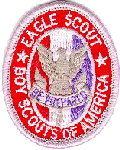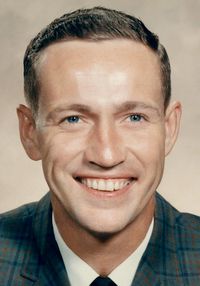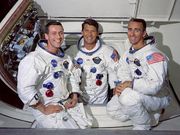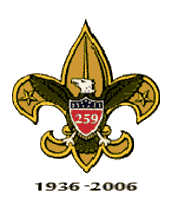Donn F. Eisele 

Donn Fulton Eisele (June 23, 1930 - December 2, 1987) was born in Columbus, Ohio and served as a Colonel in the USAF, as well as an astronaut with NASA.
Education
Graduated from West High School, Columbus, Ohio; received a Bachelor of Science degree from the United States Naval Academy in 1952 and a Master of Science degree in Astronautics in 1960 from the Air Force Institute of Technology, Wright-Patterson AFB, Ohio.
Organizations
Member of Tau Beta Pi, National Engineering Society.
Special honors
Earned Eagle Scout. Received the NASA exceptional Service Metal, Air Force Senior Pilot Astronaut Wings, Air Force Distinguished Flying Cross; co-recipient of the AIAA 1969 Haley Astronautics Award; presented National Academy of Television Arts and Sciences Special Trustees Award in 1969.
Experience
Eisele graduated from the United States Naval Academy and chose a career in the Air Force. He is also a graduate of the Air Force Aerospace Research Pilot School at Edwards AFB, California.
He was a project engineer and experimental test pilot at the Air Force Special Weapons Center at Kirtland AFB, New Mexico. In this capacity, he flew experimental test flights in support of special weapons development programs.
He logged more than 4,200 hours flying time — 3,600 hours in jet aircraft.
NASA experience
Eisele was one of the third group of astronauts selected by NASA in October 1963.
On October 11, 1968, he occupied the command module pilot seat for the eleven-day flight of Apollo VII—the first manned flight test of the third generation United States spacecraft. With spacecraft commander Walter M. Schirra, Jr., and lunar module pilot Walter Cunningham, Eisele participated in and executed maneuvers enabling the crew to perform exercises in transposition and docking and lunar orbit rendezvous with the S-IVB stage of their Saturn IB launch vehicle; completed eight successful test and maneuvering ignitions of the service module propulsion engine; measured the accuracy of performance of all spacecraft systems; and provided the first effective television transmissions of onboard crew activities.
Apollo 7 was placed in an Earth-orbit with an apogee of 153.5 nautical miles (284.3 kilometers) and perigee of 122.6 nautical miles (227.1 km); and the 260-hour, four-and-a-half million mile (7.25 Gm) shakedown flight was successfully concluded on October 22, 1968, with splashdown occurring in the Atlantic, some eight miles (15 km) from the carrier ESSEX (only three-tenths of a mile or 0.6 km from the originally predicted aiming point).
He served as backup command module pilot for the Apollo 10 flight. But due to problems between him, the rest of the Apollo 7 crew, and former flight director Christopher Kraft, he was replaced by Stuart Roosa as part of the original Apollo 13 prime crew--the crew that switched with Jim Lovell's original Apollo 14 prime crew.
Colonel Eisele logged 260 hours in space.
In July 1972, Colonel Eisele retired from the Air Force and left the space program to become Director of the U.S. Peace Corps in Thailand. Upon Returning from Thailand, Eisele became Sales Manager for Marion Power Shovel Company, a division of Dresser Industries. Eisele handled private and corporate accounts for the investment firm of Oppenheimer & Company.
Donn died of a heart attack while on a business trip to Tokyo, Japan. He is survived by his wife Susan and their two children. Colonel Eisele had four children from a previous marriage.
In the 1998 miniseries From the Earth to the Moon Eisele was played by John Mese.

The Apollo 7 crew: Donn Eisele(l.), Wally Schirra (c.), and Walter Cunningham (r.)

